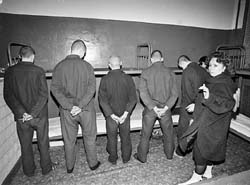Observers Should Watch Voting in Prisons, Believes Ombudsperson

Last Thursday Verkhovna Rada Human Rights Ombudswoman Nina Karpachova continued her inspection of pretrial detention facilities.
According to the Ombudsperson, she and journalists try to spot violations by keeping track of the whole procedure our compatriots have to go through after being detained by police. For example, she has already inspected district police stations, preliminary detention facilities for adults and juveniles, and temporary detention cells. Now is the turn of penal institutions. One of the first inspected was Pretrial Detention Center (SIZO) No. 13, also popularly known as Lukyanivka. As Ms. Karpachova pointed out, notable progress has been achieved here as well as in other similar institutions of Ukraine. In particular, 80% of the windows had the so- called iron Venetian blinds removed and replaced by bars. “I consider light and fresh air in cells a question of utmost importance,” the rights advocate said. Indeed, the louver cells in which semidarkness reigns even in daytime and those furnished with conventional bars are beyond comparison. Moreover, one must take into account the factor of overcrowding: the SIZO, originally planned for 3250 inmates, today contains 3327 detainees. Yet, despite the overload of 77 inmates, all the inmates have separate bunks, SIZO Chief Ivan Skorobahach said. Meanwhile, in addition to the usual categories of detainees, the SIZO also holds about twenty juveniles sentenced to a new punishment, shock probation, whereby they do a six month jail term banned from visitations and receiving parcels. It is planned to set up special detention houses for them in the future, but now that the penitentiary system is short of funds, it is more practical to reserve a certain number of SIZO places for this kind of inmate, Volodymyr Lievochkin, chief of the Punishment Supervision Department, says.
Meals still remain one of the most important problems for detainees. The Ombudswoman estimates that the state earmarks about two hryvnias a day for the nourishment of one inmate. Mr. Lievochkin admits there are problems with meat, fish, and fat, but the jail-run farms and bakeries as well as foodstuffs purchased by tender make it possible to organize “adequate three meals a day.” In addition, Ms. Karpachova says, it is necessary to raise the upper limit of a parcel, now eight kilos a month. As The Day’s correspondent was told by the parents of SIZO inmates, it is sometimes extremely difficult to transfer these parcels. What also arouses concern is the fact that, despite the optimistic reports of jail chiefs, inmates’ relatives claim that their kin are being maltreated, beaten, denied proper food and medical aid. In addition, according to Ms. Karpachova, what remains a really huge problem is that courts opt on a massive scale for arrest as a preventive measure against suspects. Meanwhile, her information says that about every fifth Lukyanivka detainee is later acquitted in court.
Incidentally, asked by The Day if the imprisoned are entitled to a free vote on March 31, Ms. Karpachova said that, with more than 220,000 Ukrainians being behind bars (which comes to about one percent of the voting public, taking into account the usual turnout in Ukraine — Ed.), it is necessary to ensure as much possible transparent and fair voting in penal institutions. She says this will be possible only with the mandatory presence of observers. One should tighten control over this process at all levels precisely now, she noted. “Let us hope that the system of transparency, now being established by various political forces, the Central Electoral Commission, and international organizations, will make it possible to conduct as transparent and fair voting as possible,” she emphasized.






